“Disease Detectives” Strengthen Response to Public Health Threats in Mozambique
Summary
- Skilled field epidemiologists, or disease detectives, help prevent, detect, and respond to disease outbreaks before they become epidemics.
- The CDC Field Epidemiology Training Program (FETP) contributes to global health security by training the public health workforce.
- The 2021 Mozambique FETP cohort includes epidemiologists from other Portuguese-speaking countries.
- Mozambique FETP is currently funded by the U.S. President’s Emergency Plan for AIDS Relief (PEPFAR) and the U.S. President’s Malaria Initiative (PMI).
A US Centers for Disease Control and Prevention (CDC) training program prepares field epidemiologists, known as disease detectives, to respond to public health threats like COVID-19 in Mozambique.
Strengthening the workforce of national public health systems is one of the main objectives of CDC’s global work. CDC’s Field Epidemiology Training Program (FETP) is an example of how technical and financial assistance benefit countries’ public health workforce and contribute to global health security.
Since 2010, CDC supports the Mozambique FETP program through a partnership with the Ministry of Health (MOH), the National Institute of Health (INS), and the Faculty of Medicine of Eduardo Mondlane University (FM-UEM). The residents of the Master level course comprise of public health professionals who serve the Mozambican Government, including physicians, veterinarians, biologists, and higher-level laboratory technicians.
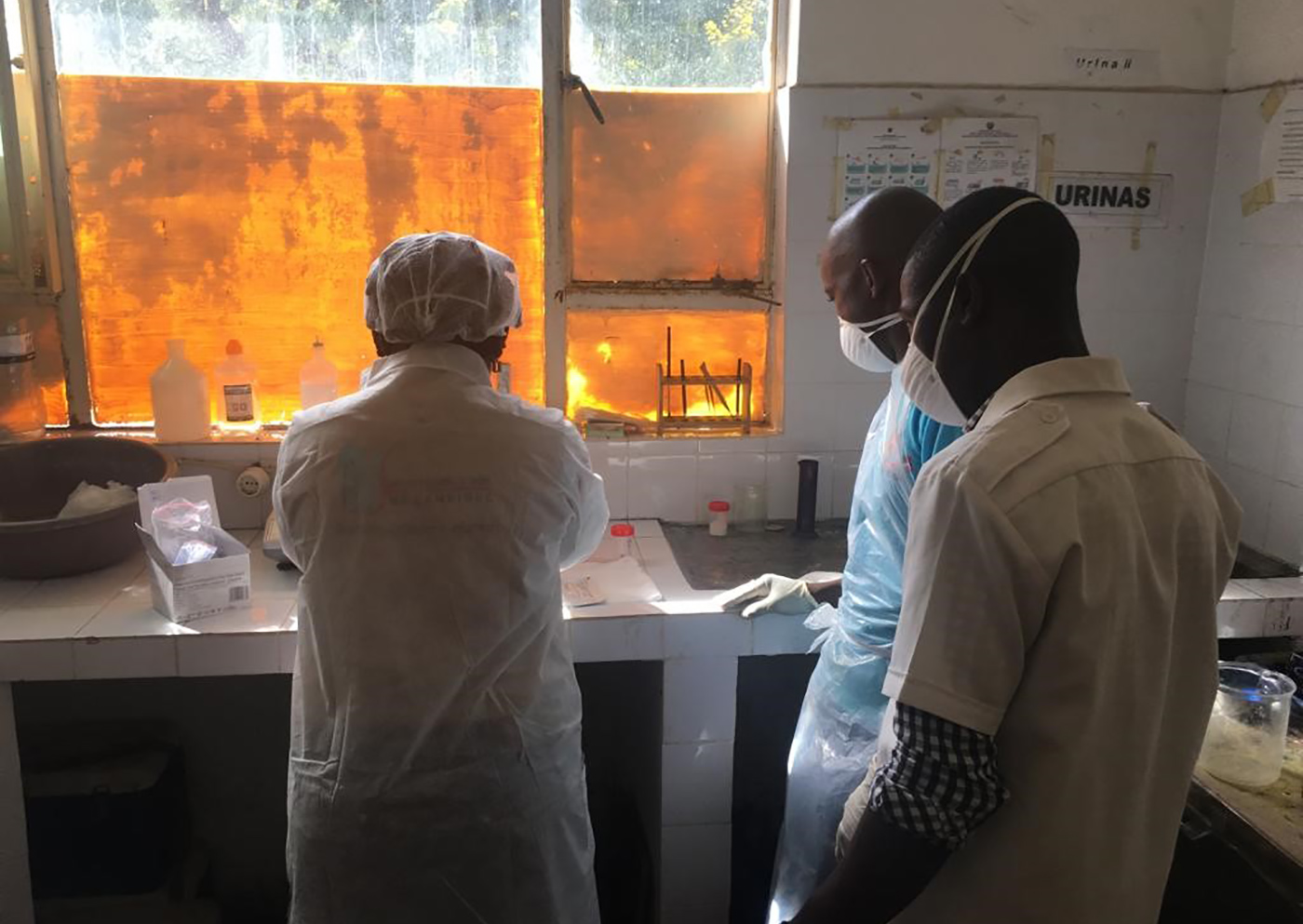
FETP graduates training to use cholera rapid diagnosis tests in the aftermath of Cyclone Idai in Sofala, Mozambique (March 2019). Photo by Erika Rosetto/CDC.
Program funding is currently provided by the U.S. President’s Emergency Plan for AIDS Relief (PEPFAR) and the U.S. President’s Malaria Initiative (PMI). Since its inception, the program has graduated 48 residents, a number expected to grow over the years.
Disease detective training
Field epidemiology residents, familiarly known as “disease detectives” attend theoretical and practical classes. They also gain practical experience working in strategic areas of MOH and INS focused on disease control, such as malaria, HIV, and tuberculosis. Residents work in cross-cutting departments of MOH such as epidemiology, and in reference laboratories of INS including tuberculosis, serology, microbiology, virology, and molecular biology. Additionally, CDC technical advisors provide training to improve technical working skills, particularly in community settings.
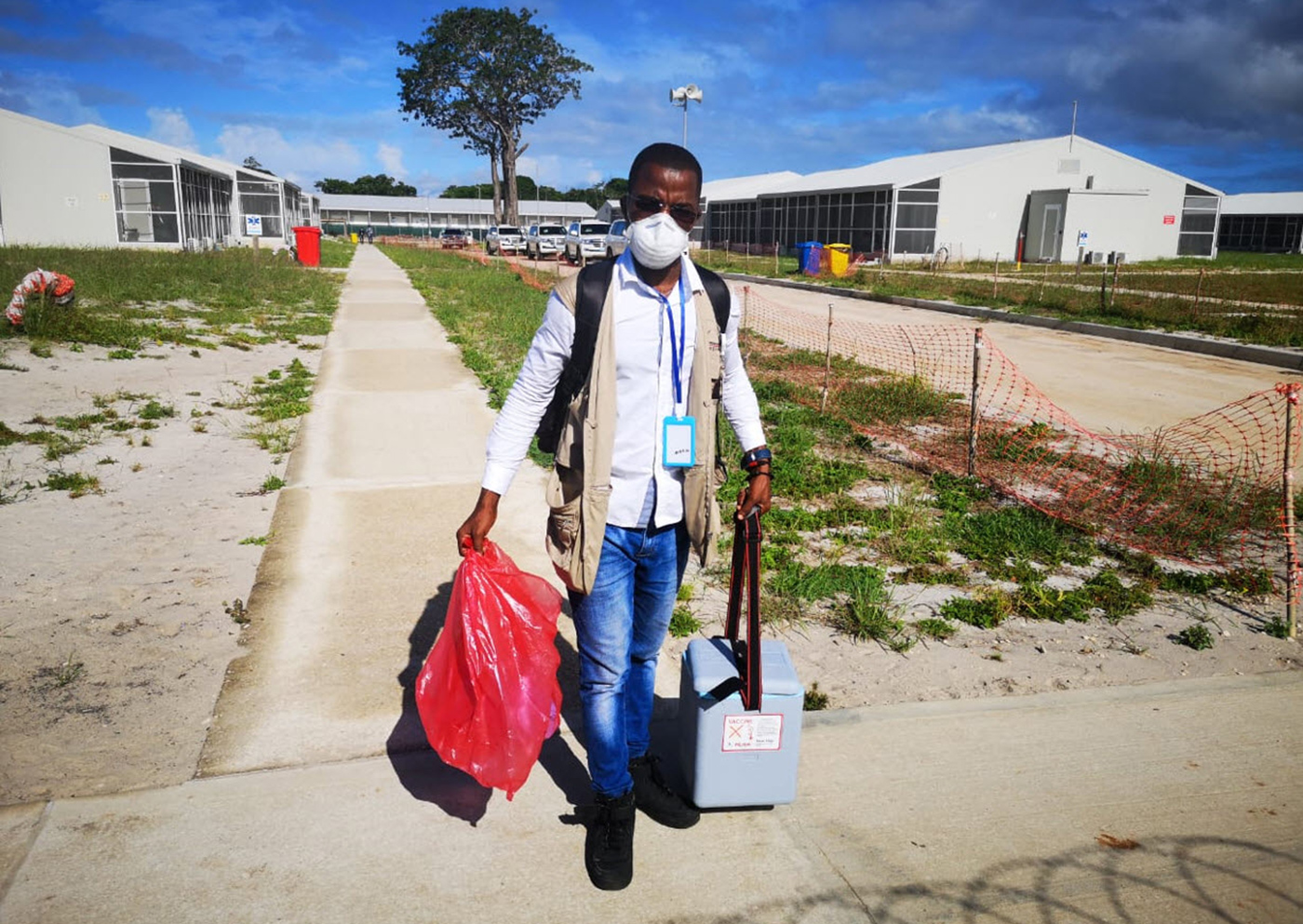
FETP graduate Hélio Elias during a COVID-19 outbreak investigation in Afungi, Cabo Delgado. Photo by Angêlo Augusto do Rosário/Mozambique FETP.
The Mozambican “disease detectives,” with the support of CDC and INS, have contributed to new scientific evidence. In the last two years, they have submitted more than 20 manuscripts to international reference journals documenting epidemiological studies, evaluations of surveillance systems, and responses to public health emergencies. In addition, they have presented more than 100 scientific abstracts at national and international scientific conferences.
At the frontline responding to public health threats
Since 2010, the residents have responded to more than 40 disease outbreaks, including measles, cholera, rabies, typhoid fever, vaccine-derived polio, malaria, and dengue. Residents have played a key role in pesticide and food poisoning cases. Their work has also been crucial in responses to natural disasters.
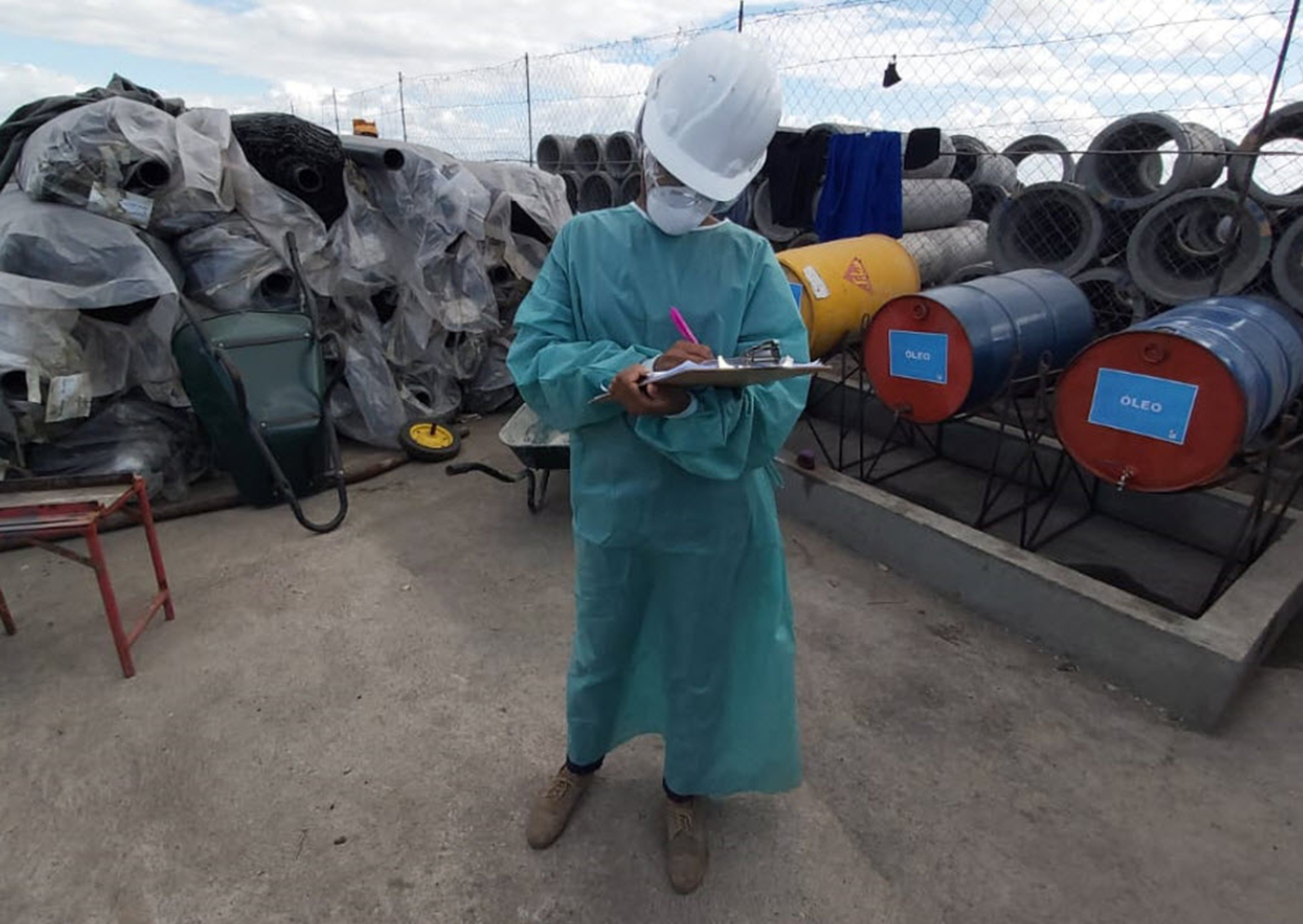
FETP graduate Neusa Fataha, supporting COVID-19 response in Maputo city´s harbor (May 2020). Photo by Sheila Uamba/Mozambique FETP.
In 2019, the work of “disease detectives” was essential in the aftermath of cyclones Idai and Kenneth, which affected more than two million people and caused around 600 deaths, according to the United Nations Office for the Coordination of Humanitarian Affairs. In coordination with the INS and CDC, the FETP residents supported health and laboratory surveillance activities to detect disease outbreaks, their modes of transmission, geographic areas of increased prevalence, and high-risk populations. They identified a cholera outbreak and guided a vaccination campaign that reached one million people. Furthermore, in collaboration with PMI, FETP residents provided data for malaria control interventions, including the distribution of insecticide-treated mosquito nets.
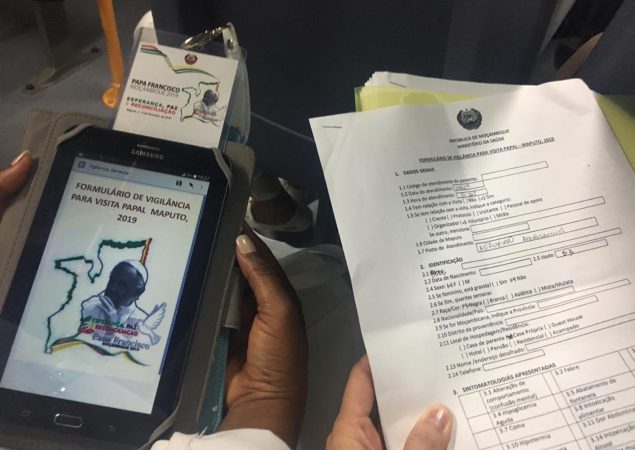
FETP graduates supported health surveillance activities during the Pope Francis visit to Maputo, Mozambique (September 2019). Photo by Mozambique FETP.
In preparation for large public events in Mozambique, residents support the implementation of real-time health surveillance systems to prepare for the possible emergence of disease outbreaks. Before the 2011 Maputo Pan African Games and the 2019 visit of Pope Francis, residents helped collect, compile, and analyze epidemiological data collected in health units.
These epidemiologists have also made great contributions to the COVID-19 pandemic response in Mozambique. Since the first case was confirmed in the country, in March 2020, they have supported the investigation and testing of suspected and confirmed cases, screening of positive case contacts, and analysis of data to produce recommendations for COVID-19 control measures. They support the identification of new SARS-CoV-2 circulating variants. This surveillance work contributed to the control of new outbreaks, such as the one in the city of Nampula between May and June 2020. Residents also train health technicians, and help disseminate guidelines and policies aimed at preventing COVID-19 in the community and health service contexts.
2021 Mozambique FETP Innovations
In August, FETP welcomed a new training cohort that for the first time included international residents. The cohort includes 10 residents from Mozambique and two from Guinea-Bissau. This is an effort by the Mozambican FETP to support Portuguese-speaking African countries.
This year, for the first time, the Mozambican FETP will offer the FETP-Frontline course, that is available in other countries. The programs’ main objective is to strengthen the surveillance and response capacity of district-level health authorities. The 12-weeks fieldwork course strengthens skills to monitor and evaluate the quality of health surveillance data, data analysis, interpretation of epidemiological data, informative reporting for decision making, conducting and supporting case investigation, and communication skills.
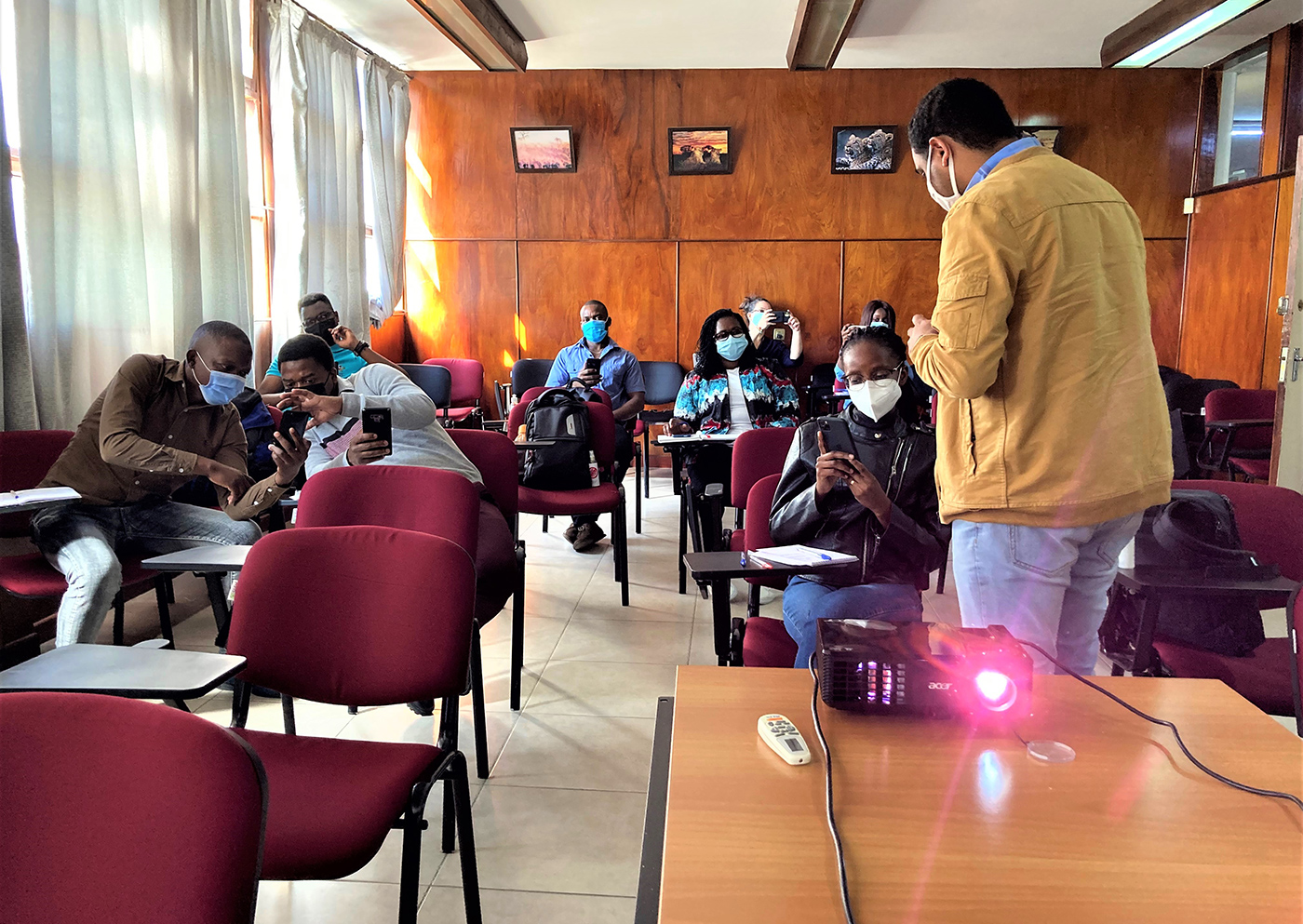
Mozambican FETP residents attend a public health photography class led by the CDC office based in Maputo (September 2019). Photo by Emanuel Pereira/CDC.
Future plans for the Mozambican FETP include the certification of its quality. Mozambican FETP plans to prepare an application to obtain the level of accreditation of the Global Network of Field Epidemiology Program (TEPHINET).